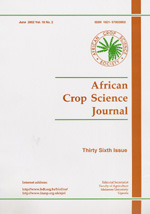
|
African Crop Science Journal
African Crop Science Society
ISSN: 1021-9730
EISSN: 1021-9730
Vol. 9, No. 1, 2001, pp. 203-207
|
 Bioline Code: cs01049
Bioline Code: cs01049
Full paper language: English
Document type: Research Article
Document available free of charge
|
|
|
African Crop Science Journal, Vol. 9, No. 1, 2001, pp. 203-207
| en |
Integrated Management of Early and Late Blights of Potatoes in Israel
Shitienberg, D.
Abstract
Potatoes are grown in Israel in two growing seasons, autumn and spring. Two
foliar diseases, early blight (Alternaria solani) and late blight (Phytophthora
infestans) threaten the crop and if not managed properly, may induce substantial
yield losses. Concepts for the integration of genotype resistance, age-related
resistance and fungicide type for the suppression of both pathogens were developed
based on the epidemiology of the pathogens and in relation to their interactions
with the host. The concepts were evaluated in 7 field experiments from 1994
to 1998. Analysis of disease progress curves revealed that in plots managed
according to the integrated management concepts, early blight was suppressed
as good as in plots treated with a specific fungicide against A. solani,
and late blight was suppressed as good as in plots treated with specific fungicides
against P. infestans. Less sprays and lower quantities of fungicidal
active ingredients were applied in plots treated according to the integrated
management strategy. Yield in the integrated management treatment did not differ,
or was significantly higher, than yield in the other treatments.
Keywords
Alternaria solani, integrated disease management, Israel, Phytophthora infestans, Solanum tuberosum
|
| |
| fr |
Shitienberg, D.
Résumé
Les pommes de terre sont cultivées en Israël pendant deux saisons
culturales, l'automne, et le printemps. Deux maladies foliaires, la bactériose
(Alternaria solani) et le mildiou (Phytophytora infestans) envahissent
la culture et si elles ne sont pas bien gérées, elles peuvent
causer des pertes énormes de rendement. Les concepts de l'intégration
de la résistance génotypiques, résistance liée à
l' âge et le type de fongicide pour la suppression des deux pathogènes
ont été développés basés sur l' épidémiologie
des pathogènes et en relation de leur intéractions avec l'hôte.
Les concepts ont été évalués dans 7 champs depuis
1994 jusqu'en 1998. L'analyse de progression des maladies a montré que
dans les parcelles gerées suivant les concepts de gestion, la bactériose
a été suppressée comme dans les parcelles traitées
avec un fongicide spécifique contre A. solani et le mildiou a
été réduit comme dans les parcelles traitées evec
un fongicide spécifique contre P.infestans. Les pulvérisations
et les faibles quantités de fongicides à ingrediants actifs ont
été appliquées dans les parcelles selon la stratégie
de gestion intégrée n'ont pas été différentes
ou étaient significativement élevées plus que les rendements
dans les autres traitements.
Mots Clés
Alterinaria solani, getion intégrée des maladies, Israël, Phytophytora infetans, Solanum tuberosum
|
| |
© Copyright 2001 - African Crop Science Society
|
|
